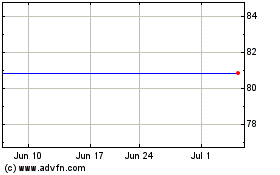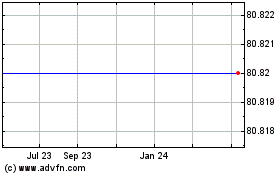Many Defibrillator Patients Don't Meet Guidelines - Study
January 04 2011 - 2:46PM
Dow Jones News
A study of nearly 112,000 implantable-defibrillator patients
indicated more than one in five people didn't meet medical
guidelines for getting the expensive devices, and in some cases may
not have needed one.
The findings suggest that if doctors better stick to guidelines,
it could lead to lower health-care costs, which could dampen a
roughly $4.3 billion U.S. defibrillator market led by Medtronic
Inc. (MDT), Boston Scientific Corp. (BSX) and St. Jude Medical Inc.
(STJ). The companies are already dealing with sluggish growth and
pressure on product prices; the devices can cost upwards of $25,000
each.
Defibrillator patients who fell outside guidelines were often
sicker, leading to a higher rate of complications--including
death--at hospitals, according to the study, which is being
published in the Journal of the American Medical Association. This
increase in complications was modest but still problematic, study
authors said.
"While a small risk of complications is acceptable when a
procedure has been shown to improve outcomes, no risk is acceptable
if a procedure has no demonstrated benefit," they wrote. They were
led by Sana M. Al-Khatib, a cardiologist at Duke University Medical
Center in North Carolina.
The study was embargoed for release at 4:00 p.m. EST Tuesday by
JAMA, but leaked early and appeared to pressure device-makers'
shares. Among them, St. Jude recently traded down 2.2% to $41.36
while Boston Scientific declined 2.2% to $7.43.
The study was funded by the National Heart Lung and Blood
Institute. Al-Khatib and other study authors reported various ties
to Medtronic and other drug and device firms.
The study reviewed data from a large national registry that
collects information on heart patients, which has some limitations.
For example, medical records may not precisely identify when heart
failure began for some patients, but giving defibrillators too soon
after a heart-failure diagnosis was the main way doctors didn't
follow medical guidelines, two doctors noted in a JAMA
editorial.
The study doesn't discern why doctors weren't sticking to
guidelines. Al-Khatib suggested that doctors' lack of awareness and
knowledge were the culprits and indicated manufacturers didn't play
a role.
-By Jon Kamp, Dow Jones Newswires; 617-654-6728;
Jon.Kamp@dowjones.com
SJM (NYSE:STJ)
Historical Stock Chart
From Jun 2024 to Jul 2024

SJM (NYSE:STJ)
Historical Stock Chart
From Jul 2023 to Jul 2024
